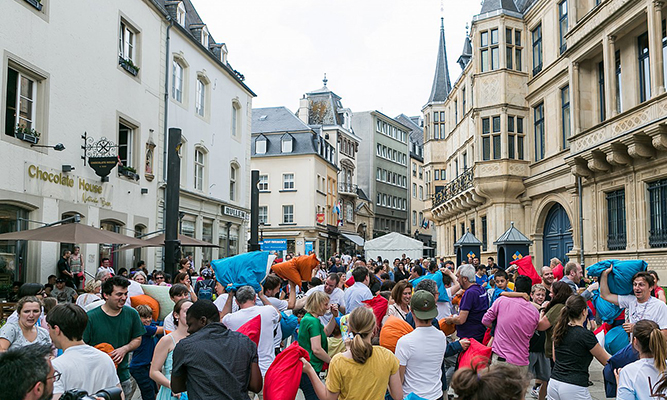On 9 June, the second edition of the Giant Public Pillow Fight took place in Luxembourg in front of the Grand Ducal Palace. The event’s aim was to raise awareness about Parkinson’s disease and the research activities of the National Centre of Excellence in Research on Parkinson’s Disease (NCER-PD).
The Pillow Fight was co-organised by the National Centre of Excellence in Research on Parkinson’s Disease (NCER-PD), the Luxembourg Centre for Systems Biomedicine (LCSB) of the University of Luxembourg and the Luxembourg Institute of Health (LIH). The aim? Have fun while supporting a good cause: raise awareness about Parkinson’s disease and the necessity to continue researching new methods for diagnosis, prevention and therapy. This event is a symbol of the fight that many in Luxembourg are waging every day against Parkinson’s: the afflicted, their families, doctors and nurses, researchers and many more.
From the family pillow fight to the final battle, there was something for everyone throughout the afternoon and, like last year, no dress code was too extravagant! On top of sending pillows flying into the air, visitors also had the opportunity to visit booths where scientists shared information about Parkinson’s disease and research in Luxembourg. The participants were able to try on a Parkinson suit at the LIH booth, for example, or to test their dexterity and their senses with the NCER-PD team. Visitors of all ages also had the chance to do some experiments prepared by the Scienteens Lab to better understand how neurons work.
The event started with opening speeches given by Romain Martin (Vice-Rector for academic affairs at the University of Luxembourg), Frank Glod (Luxembourg Institute of Health), Marc Schiltz (Secretary General of the Luxembourg National Research Fund), Roseline Lentz (President of the association Parkinson Luxembourg) and Lydia Mutsch (Luxembourg Ministry of Health).

Throughout the afternoon, hundreds of visitors could not only join the pillow fight, but also visit the stands of the NCER-PD, ParkinsonNet, Centre Hospitalier Emile Mayrisch (CHEM), Luxembourg Institute of Health (LIH) and the Scienteens Lab, and learn more about research on Parkinson’s disease in Luxembourg. They could also try on a Parkinson suit, which simulates the two most representative motor symptoms of Parkinson’s disease: the muscle rigidity and the tremors. Because the disease affects other parts of the body as well, the researchers also showed the test used in the study for other symptoms. The visitors could test their dexterity, their sense of smell and their color vision, thus understanding how the brain controls the senses and the movements and why they are affected by Parkinson’s disease.
“We are proud to be organising this event in Luxembourg together with the LIH and the LCSB and would like to thank all our partners without whom this event would not have been possible,” says Prof. Dr. Rejko Krüger, head of NCER-PD and a neurologist at the Centre Hospitalier de Luxembourg (CHL).
As a physician and researcher, Krüger knows the situation of Parkinson’s patients well. “Treatment of this disease has improved considerably in recent years, but there is still a lot to do,” Krüger says. One of the biggest problems so far is that there are hardly any personalised therapies. The disease can be triggered by any number of different genetic or external factors. “So, one person’s Parkinson’s differs from another’s,” Krüger continues. “Only once we have understood the diversity of causes, we will be able to work on developing therapies that take into account the patient’s personal situation”
-
About NCER-PD: NCER-PD is a joint initiative of four partners in Luxembourg – Luxembourg Centre for Systems Biomedicine, Centre Hospitalier de Luxembourg, Integrated Biobank of Luxembourg, and Luxembourg Institute of Health – who are uniting their efforts and expertise to develop new methods for the early diagnosis and treatment of Parkinson’s disease. The Luxembourg Parkinson’s study NCER-PD has been funded since early 2015 by the Luxembourg National Research Fund (FNR).
About LCSB: The LCSB is a biomedical research centre of the University of Luxembourg. It is accelerating biomedical research by closing the link between systems biology and medical research. Collaboration between biologists, medical doctors, computer scientists, physicists, engineers and mathematicians is offering new insights into complex systems like biological cells, organs, and organisms. These insights are essential for understanding principal mechanisms of disease pathogenesis and for developing new tools in diagnostics and therapy. LCSB focuses on neurodegenerative diseases like Parkinson’s disease and the description of diseases as complex networks.




